The perilous business of recycling lead
The uncontrolled rise of illegal backyard lead recycling units is putting at risk the lives of labourers and people residing nearby
by Maitreyee Handique, LiveMint.com
 |
 |
 |
 |
| |
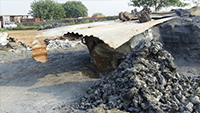 |
|
| |
Residues of melted batteries lie in the grounds of an illegal smelter. Lead is hazardous for health and, depending on length of exposure, can cause kidney and blood disorders, and in its severest form, death. |
|
 |
 |
 |
| |
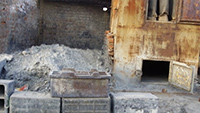 |
|
| |
Battery discards inside a factory. |
|
 |
 |
 |
| |
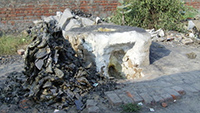 |
|
| |
Open smelters dot the farmland in Bajghera village on the Delhi-Gurgaon border, as more batteries wind up in the informal market. |
|
 |
 |
 |
| |
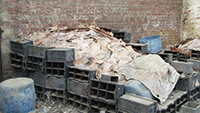 |
|
| |
Battery garbage is often dumped outside factories, by the roadside. |
|
 |
 |
 |
| |
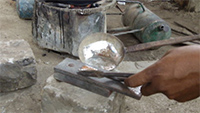 |
|
| |
The lustrous silver metal, which is lead, is melted further to make battery components.
Photos by: Maitreyee Handique / Mint |
|
 |
 |
 |
|
| |
18 November 2010 (New Delhi) – By evening in Amit Vihar, a border outpost between Delhi and Uttar Pradesh, tall chimney stacks begin to belch dark grey smoke, turning the sky into a murky haze. It is here that people such as Satish Kumar work, recycling old lead batteries to make a living.
A young man in his 20's who came to Delhi looking for a job, Kumar has spent the last six years stoking fires at an illegal smelter. Piles of spent batteries arrive, arranged to be dropped off by his employer, who lives 500km away in Varanasi.
Kumar and his fellow workers then spend the night ripping out battery parts with axes and with their bare hands. And, as the neighbourhood sleeps, they burn them, collecting the lustrous silver liquid in casts before it clots into hard metal.
The work, Kumar knows, is hazardous, but there’s no one to tell him exactly how unsafe it is. To avoid the noxious fumes, he and his colleagues cover their faces with a piece of cloth, he says. “We know the dangers, but we have no other choice,” he says.
But the business of backyard lead recycling is thriving. As India’s economy booms, the demand for lead-acid batteries grows—and so, in turn, does the demand for the lead that Kumar extracts from old cells.
These backyard techniques are crude and simple to replicate, and prices of lead have doubled in the last five years, making illegal recycling even more profitable.
Much of this clandestine activity carries on taking full advantage of weak implementation of pollution laws, with long-term public health consequences. The World Health Organization (WHO) says more than 120 million people living in the developing world are “overexposed” to lead—roughly three times the number of people infected by HIV.
Experts say the bigger problem in India is that there is no programme as yet to study the long-term impacts of lead poisoning, despite the heavy use of this metal in assorted industries.
While dangers of lead exposure are well known, they have so far only contributed to case studies. A few of these studies point to grave numbers.
A 2008 survey of unregistered recyclers in Hubli, in Karnataka, by the National Referral Centre for Lead Poisoning in India (NRCLPI) found blood lead levels of 90-160 micrograms per decilitre (mg/dl)—three to six times higher than the limit permissible on factory premises. The introduction of unleaded petrol in the early part of this decade brought lead levels in the air down to a certain degree, but scattered recycling outfits are having the opposite effect as far as pollution control goes.
“The phase-out has had a substantial impact,” says Kalpana Balakrishnan, a researcher with Sri Ramachandra Medical College and Research Institute, in Chennai. “But additional reduction needs to be achieved.”
In 2005, the institute’s department of environment health engineering carried out a survey among 800 Chennai schoolchildren. It found that, while blood lead counts had fallen 30% to 11 mg/dl after the introduction of unleaded petrol, it remained a notch higher than the permissible limit set by WHO for the general populace.
Lead is most often used in battery manufacture, but there exists no precise data on this industry’s output.
L. Pugazhenthy, executive director of India Lead Zinc Development Association, a body which provides technical inputs to the battery industry, reckons that 40-50 million units are produced in every year, 40% of them in the informal sector.
The scraps of these batteries, once dead, are considered dangerous, and so they need to be recycled in controlled environments; there is more concentrated lead in one battery than in 26,944 cellphones or six television sets. The 2003 Basel Convention imposes strict restrictions on cross-border battery trading.
But these dangers have been ignored by policymakers, according to Habibullah Sayid, a WHO consultant and a former researcher with the National Institute of Occupational Health.
“What we need is regular surveys of blood lead counts among people to ascertain the real situation,” he says, adding that lead poisoning is often not immediately apparent, its symptoms easily confused with those of other ailments. Much of the backstreet lead finds its way to local manufacturers of sundry battery brands. In Old Delhi’s Gokhale Market, battery shops sell products with brand names such as Z-power, Active and Power-on.
Many of these claim to be made with Japanese technology; in reality, they are assembled under rows of open tin sheds, only a few feet from where they are sold.
Slim blocks of silvery lead arrive from recycling plants to this market, purchased in bulk by the shop owners who also peddle the local makes. They pass on the raw material to workers like Ramesh, a 29-year-old native of Uttar Pradesh who uses only one name.
Ramesh then melts the lead down further to make components such as battery plates. It takes him just under 30 minutes to assemble a whole battery unit, complete with label. Earning Rs. 60 per unit, he and two other co-workers produce 12-20 units a day. Ramesh claims he’s not worried about his health. He works outdoors, and “here the lead escapes into the (open) air”, he says. “Only if you work in a recycling factory, you are in trouble.”
This sort of a general lack of awareness persists, but authorities in charge of curbing pollution have also been unable to fully implement the law. The Central Pollution Control Board (CPCB) framed its Battery Management Rules a decade ago, but the industry has grown faster than they can track it. There are now 336 registered recyclers in the country, handling 1,200 million kg of old batteries a year; the number of unregistered recyclers is far bigger.
Most retired batteries are meant to be collected by dealers by paying a small commission, about Rs. 200-300, to the consumer for returning the old unit. “But many times, the illegal buyers offer better rates,” said a CPCB official who wanted to remain anonymous. “Also, it’s not legally binding for the dealers to pay a fixed rate.”
It’s also true that battery recycling, like shipbreaking or computer-waste sorting, provides employment to thousands of India’s poor. As the global economy recovers slowly in the aftermath of the meltdown, more and more workers are ending up with jobs in businesses fuelled by poverty, according to H. Mahadevan, deputy general secretary of the All Indian Trade Union Congress.
Attempts by trade unions to prevent workers from taking up hazardous occupations, Mahadevan says, have been futile, since most workers have no alternate options. “Under law, workers can reject such employment. But who’s going to, when there is no other livelihood?” he says. “Jobs come first, then decent work.”
Battery recycling has thus become a cottage industry for people eking out a living. In south Delhi’s Bajghera village, not far from the sprawling farmhouses of the city’s elite, Surendra Kumar, a young man of 25, evades questions, but says that he is only “guarding” a smelter, not involved in the actual work. In a clearing, next to a field being ploughed for a crop of commercial vegetables, residue of melted down batteries lie in a heap near two such smelters. A little distance away, two more smelters lie on the side of the dirt road.
Like others, Kumar says he’s aware of the effects of lead, but he has found little else to do after he lost his job at a textile factory. “Like rich people, we too have families,” he says. “And we need the work.”
FAIR USE NOTICE. This document contains copyrighted material whose use has not been specifically authorized by the copyright owner. The Basel Action Network is making this article available in our efforts to advance understanding of ecological sustainability and environmental justice issues. We believe that this constitutes a 'fair use' of the copyrighted material as provided for in section 107 of the US Copyright Law. If you wish to use this copyrighted material for purposes of your own that go beyond 'fair use', you must obtain permission from the copyright owner.
More News
|